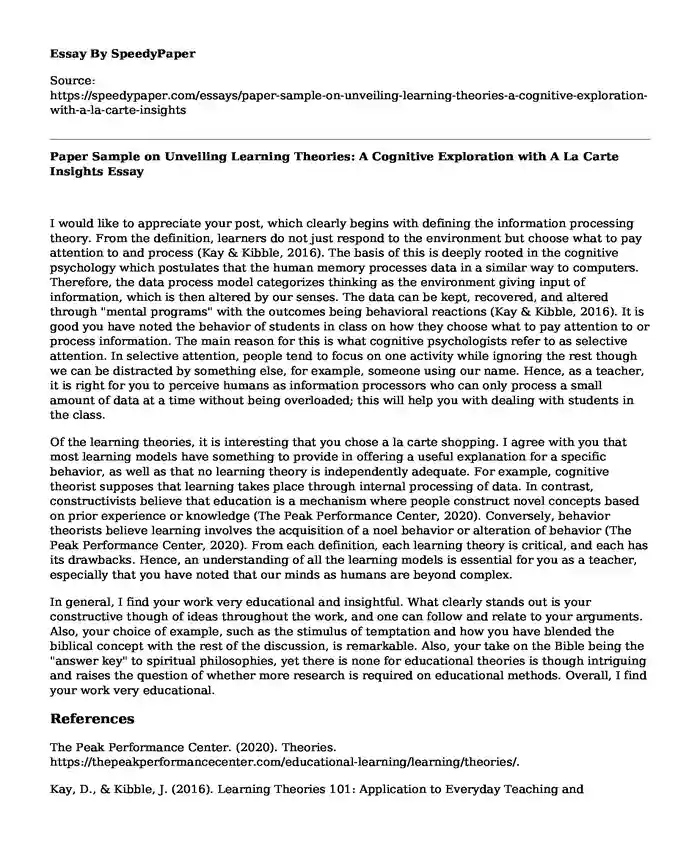
| Type of paper: | Essay |
| Categories: | Learning Education Psychology |
| Pages: | 2 |
| Wordcount: | 492 words |
I would like to appreciate your post, which clearly begins with defining the information processing theory. From the definition, learners do not just respond to the environment but choose what to pay attention to and process (Kay & Kibble, 2016). The basis of this is deeply rooted in the cognitive psychology which postulates that the human memory processes data in a similar way to computers. Therefore, the data process model categorizes thinking as the environment giving input of information, which is then altered by our senses. The data can be kept, recovered, and altered through "mental programs" with the outcomes being behavioral reactions (Kay & Kibble, 2016). It is good you have noted the behavior of students in class on how they choose what to pay attention to or process information. The main reason for this is what cognitive psychologists refer to as selective attention. In selective attention, people tend to focus on one activity while ignoring the rest though we can be distracted by something else, for example, someone using our name. Hence, as a teacher, it is right for you to perceive humans as information processors who can only process a small amount of data at a time without being overloaded; this will help you with dealing with students in the class.
Of the learning theories, it is interesting that you chose a la carte shopping. I agree with you that most learning models have something to provide in offering a useful explanation for a specific behavior, as well as that no learning theory is independently adequate. For example, cognitive theorist supposes that learning takes place through internal processing of data. In contrast, constructivists believe that education is a mechanism where people construct novel concepts based on prior experience or knowledge (The Peak Performance Center, 2020). Conversely, behavior theorists believe learning involves the acquisition of a noel behavior or alteration of behavior (The Peak Performance Center, 2020). From each definition, each learning theory is critical, and each has its drawbacks. Hence, an understanding of all the learning models is essential for you as a teacher, especially that you have noted that our minds as humans are beyond complex.
In general, I find your work very educational and insightful. What clearly stands out is your constructive though of ideas throughout the work, and one can follow and relate to your arguments. Also, your choice of example, such as the stimulus of temptation and how you have blended the biblical concept with the rest of the discussion, is remarkable. Also, your take on the Bible being the "answer key" to spiritual philosophies, yet there is none for educational theories is though intriguing and raises the question of whether more research is required on educational methods. Overall, I find your work very educational.
References
The Peak Performance Center. (2020). Theories. https://thepeakperformancecenter.com/educational-learning/learning/theories/.
Kay, D., & Kibble, J. (2016). Learning Theories 101: Application to Everyday Teaching and Scholarship. Advances in Physiology Education, 40(1), 17–25. https://doi.org/10.1152/advan.00132.2015
Cite this page
Paper Sample on Unveiling Learning Theories: A Cognitive Exploration with A La Carte Insights. (2023, Nov 14). Retrieved from https://speedypaper.com/essays/paper-sample-on-unveiling-learning-theories-a-cognitive-exploration-with-a-la-carte-insights
Request Removal
If you are the original author of this essay and no longer wish to have it published on the SpeedyPaper website, please click below to request its removal:
- Free Essay - Cell Phones Create a Barrier to Social Connections
- Free Essay on Self-fulfilling and Self-monitoring Concepts
- Essay Sample about Therapeutic Interventions for Sexually Abused Girls
- Free Essay Example: The 1970s in America's History
- Paper Example. What Happens in a Counseling Session?
- Free Essay. Applied Behavioral Analysis in Public Schools
- Free Essay on Anticipatory Socialization and Resocialization
Popular categories




